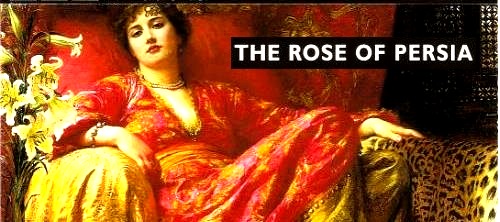The Rose of Persia was the last opera completed by Sir Arthur Sullivan and the last work produced under the supervision of Richard D'Oyly Carte, the theatre's first owner and manager. It was the first Savoy libretto by Basil Hood (1864-1917), and perhaps would have led to additional Hood-Sullivan operas has not the composer died in November 1900, before completing Hood's The Emerald Isle. Carte too died before this opera's presentation, ending an era of British comic opera that had lasted for more than three decades.
Sullivan's secretary, Wilfred Bendall, is credited with introducing Hood to Sullivan. Hood was an army captain who resigned his commission after the success of Gentleman Joe (1895), a musical comedy which led to other popular theatrical ventures. Sullivan was immediately intrigued by Hood's draft of an opera called Hassan. Preparation of Hassan was halted, however, by the production of The Lucky Star at the Savoy in January 1899. Both operas had Middle Eastern settings, and to follow one with the other would have been considered repetitious at best. Hood proposed something new, but eventually the Hassan project was taken up again. Retitled The Rose of Persia, it lasted through 220 performances to become financially the most successful Savoy opera since The Gondoliers in 1889.
The success of The Rose of Persia belongs to both the author and the composer. Hood handles his large cast of characters expertly, providing most of them with excellent opportunities to display singing, acting, and/or dancing talent. His addiction to puns has been derided as a weakness, but this is merely an outgrowth of his obvious love for the English language. This is a characteristic he shares with Gilbert, but when it came time (as it inevitably did) for contemporary critics to compare the two authors, Hood was deemed the lesser of the two. He was, however, aware of the elements that made the new theatrical form of musical comedy successful, and deftly fitted them into The Rose of Persia. The music is an interesting mixture of old and new. Ensembles, patter songs, and other numbers, including Yussuf's ever-popular drinking song, are reminiscent of the "old Sullivan" of the 1880s. The madrigal “Joy and sorrow alternate," for example, surely was meant to remind listeners of "Brightly dawns our wedding day" from The Mikado.
Other authors have noted that Sullivan was not entirely deaf to the ascending popularity of musical comedy and use the march "From morning prayer/The Sultan of Persia comes" in act two as an example. On the other hand, the orchestral textures of The Beauty Stone were not abandoned, and impressive arias for the soprano and the contralto were designed for voices of operatic calibre. These rank among Sullivan's best — and most challenging — solos.
The Savoy's turn-of-the-century team — comedian Walter Passmore (Hassan), baritone Henry Lytton (the Sultan), tenor Robert Evett (Yussuf), and contralto Rosina Brandram (Dancing Sunbeam) — were well provided for in The Rose of Persia with strong acting and singing parts. One notes that Lytton's music is of a true baritone type and not the comic patter he later became associated with. Brandram was the only artist who had lasted from the earliest days of the D'Oyly Carte Opera Company. Now in her late fifties, she went on to create parts in The Emerald Isle (1901), The Willow Pattern (1901), Merrie England (1902), A Princess of Kensington (1903), and the British premiere of Messager's Veronique (1905) before her death in 1907.
American soprano Ellen Beach Yaw created the role of Rose-in-Bloom. Yaw had an incredible coloratura voice which Sullivan exploited, writing a cadenza for her that embraced the high notes associated with the Queen of the Night in Mozart's Magic Flute. Critics' expectations that she wouldn't be able to perform this cadenza night after night proved to be correct, and she was soon replaced by Isabel Jay, who had created the small part of Blush-of-Morning. Emmie Owen had the principal dance role of Honey-of-Life, and Louie Pounds took the romantic lead as Heart's Desire.
After the deaths of Sullivan and Carte, management of the company fell to Carte's widow Helen and later to William Greet, who produced The Emerald Isle (score completed by Edward German) and the 16-performance run of a Hood double-bill, Ib and Little Christina (music by Franco Leoni) and The Willow Pattern (music by Cecil Cook). German later provided the music for two Hood librettos produced at the Savoy, Merrie England and A Princess of Kensington.
Clifton Coles

.png)
.png)





